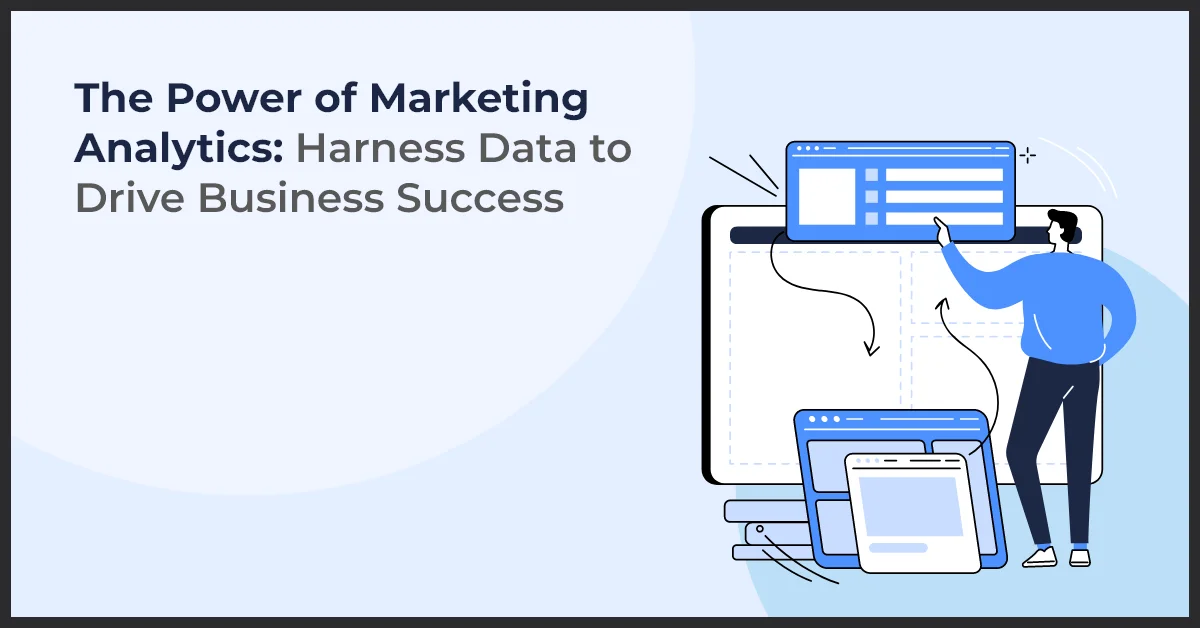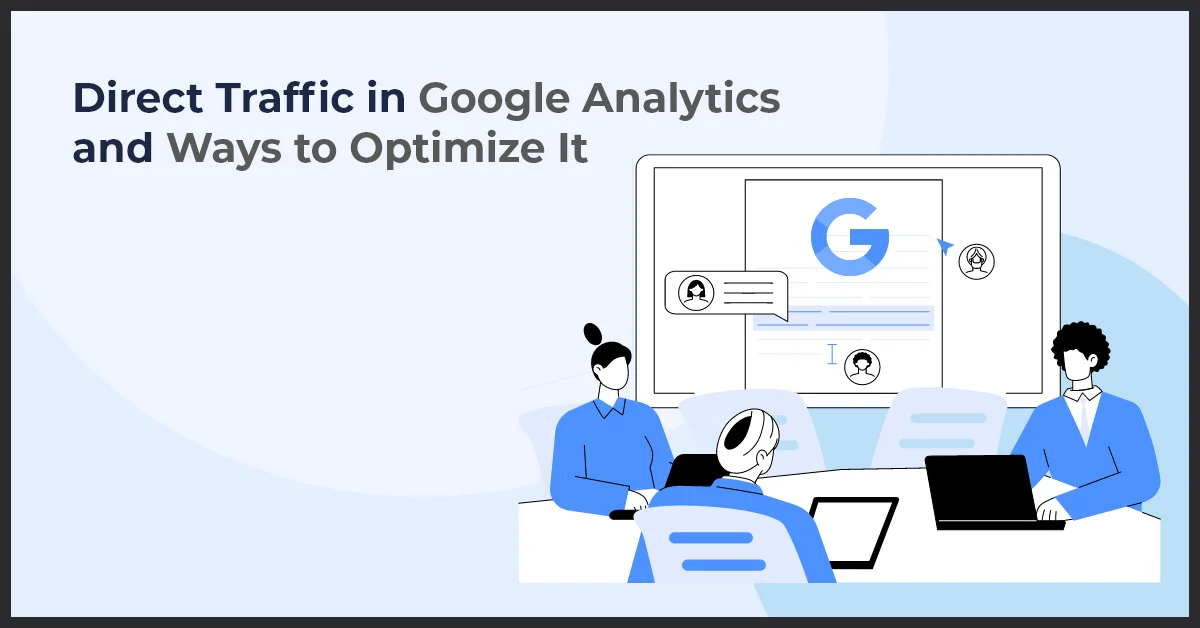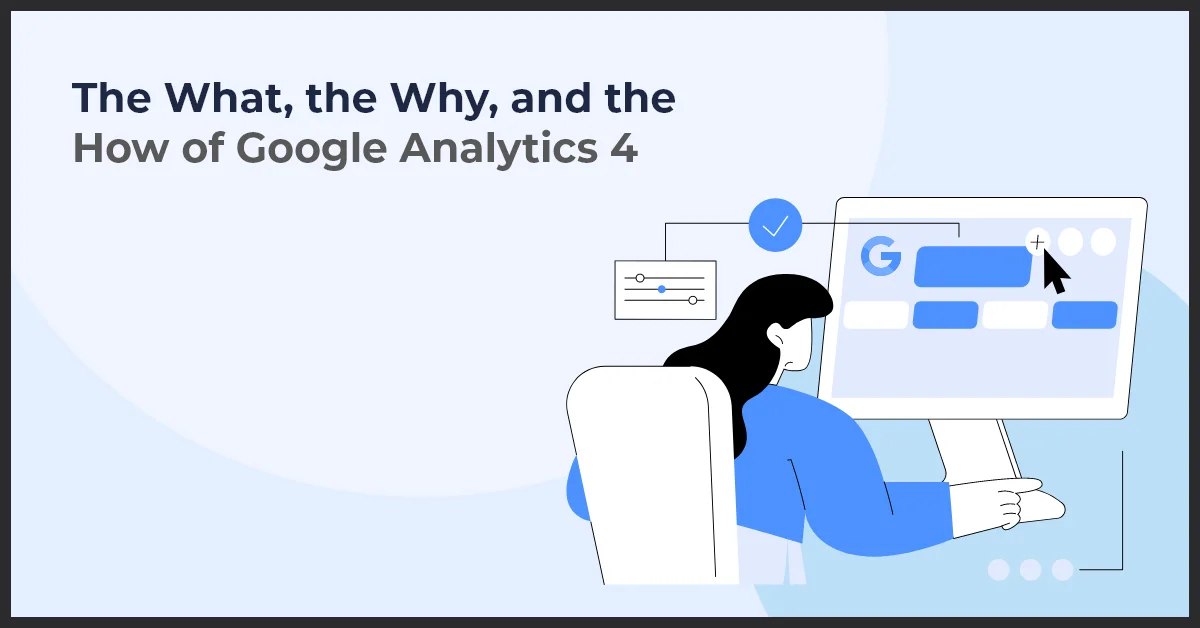The Power of Marketing Analytics: Harness Data to Drive Business Success

Published on: November 1, 2023
Updated on: July 15, 2024
2190 Views
- Analytics
15 min read
In today's rapidly evolving business landscape, marketing analytics has become an indispensable tool for businesses looking to gain a competitive edge. By analyzing vast amounts of data, businesses can uncover valuable insights and make informed decisions that lead to better outcomes and increased profitability.
Marketing analytics involves the collection, measurement, and interpretation of data related to various marketing activities and campaigns. It provides organizations with the ability to assess the effectiveness of their marketing strategies, understand customer behavior, and identify areas for improvement.
By leveraging marketing analytics, businesses can fine-tune their marketing efforts, optimize advertising spend, and enhance customer engagement. This not only improves the return on investment (ROI) but also enables companies to establish stronger customer relationships, boost sales, and drive sustainable growth.
Whether it's monitoring website traffic, analyzing social media interactions, or tracking email campaign performance, marketing analytics empowers businesses to make data-driven decisions and adapt their strategies in real time. It allows marketers to identify trends, spot opportunities, and address potential challenges, giving them a significant advantage in the marketplace.
With marketing analytics as a cornerstone of their decision-making process, businesses can unlock the full potential of their marketing efforts and stay ahead of the competition. By embracing the power of data, companies can drive their success and achieve remarkable results in today's complex business environment.
The Role of Data in Marketing Analytics
One of the key foundations of marketing analytics is the analysis of data. By harnessing the power of data, businesses can gain valuable insights into their marketing strategies and make informed decisions to drive success.
Data analysis plays a crucial role in marketing analytics by providing the necessary information to evaluate the effectiveness of various marketing campaigns and initiatives. It helps businesses understand customer behavior, preferences, and trends, enabling them to create targeted and personalized marketing messages.
When it comes to data used in marketing analytics, there are various types that are collected and analyzed. These can include customer demographics, purchase history, website interactions, social media engagement, and more. By aggregating and analyzing this data, businesses can gain a comprehensive understanding of their target audience and tailor their marketing efforts accordingly.
Data sources also play a significant role in marketing analytics. These sources can include CRM systems, web analytics tools, social media platforms, and more. Effective data management techniques, such as data cleaning, integration, and governance, are crucial to ensuring accurate and reliable analysis of the collected data.
Overall, data is the lifeblood of marketing analytics. It provides the necessary insights to optimize marketing strategies, enhance customer experiences, and drive business growth. By leveraging the power of data, businesses can stay ahead of the competition and make data-driven decisions to achieve marketing success.
Understanding Marketing Analytics
Marketing analytics is a crucial component of any successful marketing strategy. It involves the measurement, management, and analysis of marketing performance to maximize its effectiveness and drive business growth.
Key Components of Marketing Analytics
Marketing analytics encompasses a wide range of activities and data streams. Some of its key components include:
- Data Collection: Gathering and organizing various types of data, such as customer demographics, website traffic, social media interactions, and sales figures.
- Data Analysis: Analyzing the collected data to identify patterns, trends, and insights that can guide marketing decisions and strategies.
- Metrics and KPIs: Defining and tracking key performance indicators (KPIs) that provide measurable objectives for evaluating marketing campaigns and initiatives.
- Reporting and Visualization: Creating reports and visual representations of data analysis results to communicate findings and facilitate decision-making processes.
Techniques and Tools Used in Marketing Analytics
To carry out effective marketing analytics, marketers employ various techniques and utilize several tools:
- Statistical Analysis: Applying statistical methods to identify correlations, create predictive models, and uncover meaningful insights from marketing data.
- Data Mining: Utilizing advanced algorithms to discover patterns, relationships, and anomalies within large datasets.
- Machine Learning: Employing algorithms and models that enable computers to learn from and make predictions or decisions based on data.
- Marketing Automation Platforms: Using specialized software to automate marketing tasks, such as email campaigns, lead nurturing, and customer segmentation.
- Business Intelligence Tools: Leveraging software solutions that provide data visualization, reporting, and dashboard capabilities for easy data analysis and interpretation.
Real-Life Applications of Marketing Analytics
Marketing analytics finds practical applications across a variety of industries and marketing activities:
- Customer Segmentation: Analyzing customer data to identify distinct segments with specific characteristics and preferences, enabling targeted marketing campaigns.
- Conversion Rate Optimization: Analyzing website and landing page data to identify areas for improvement and optimize the conversion funnel for higher conversion rates.
- Marketing Campaign Evaluation: Measuring the effectiveness of marketing campaigns, assessing factors like ROI, customer acquisition costs, and customer lifetime value.
- Social Media Analysis: Monitoring social media metrics and sentiment to analyze brand perception, understand customer behavior, and inform social media strategies.
- Market Trends Analysis: Tracking market trends, competitor activities, and customer demand patterns to identify market opportunities and adjust marketing strategies accordingly.
Marketing analytics is a powerful tool for data-driven decision-making and achieving marketing objectives. By understanding its components, utilizing appropriate techniques and tools, and applying it to relevant real-life scenarios, businesses can gain valuable insights and drive their marketing efforts towards success.
The Importance of Analytics in Business
In today's competitive business landscape, understanding and utilizing marketing analytics has become crucial for driving growth and achieving success. Analytics provides valuable insights and data that can empower businesses to make informed decisions and optimize their marketing strategies.
One of the key benefits of analytics is its ability to drive business growth. By analyzing marketing data, businesses can identify patterns, trends, and areas of improvement. This enables them to make data-driven decisions, optimize their marketing efforts, and allocate resources more effectively.
For example, through analytics, businesses can track the effectiveness of their marketing campaigns and accurately measure their return on investment (ROI). This information helps them identify which marketing initiatives are successful and which ones need improvement. By focusing on the strategies that deliver positive results, businesses can drive growth and improve their overall performance.
Furthermore, leveraging marketing analytics can provide businesses with a competitive edge in the market. By analyzing customer behavior and preferences, businesses can gain insights into their target audience and tailor their marketing efforts accordingly. This helps them develop more targeted and personalized campaigns, resulting in better customer engagement and higher conversion rates.
Analytics can also uncover hidden opportunities and potential markets that businesses may have previously overlooked. By analyzing market trends and consumer demand, businesses can identify new niches or untapped segments to expand into. This enables businesses to diversify their offerings, reach new customers, and stay ahead of the competition.
Analytics plays a pivotal role in driving business growth and success. By leveraging marketing analytics, businesses can make data-driven decisions, optimize their marketing strategies, and gain a competitive advantage in the market. With the ability to uncover insights, measure effectiveness, and identify new opportunities, analytics has become indispensable in today's business environment.
Leveraging Marketing Analytics for Insight Generation
Marketing analytics is an invaluable tool that provides valuable insights into customer behavior and preferences. By analyzing data, businesses can gain a deeper understanding of their target audience, allowing them to make more informed decisions about their marketing strategies.
One of the key benefits of marketing analytics is the ability to identify trends and patterns. By analyzing data, businesses can spot emerging trends, customer preferences, and buying patterns. This information can then be used to develop marketing strategies that are tailored to the needs and expectations of their target audience.
Successful insight generation through marketing analytics has proven to be a game-changer for many businesses. For example, a clothing retailer may use analytics to identify that their customers prefer a certain type of fabric or a specific color. Armed with this knowledge, they can adjust their product offerings and marketing campaigns accordingly, resulting in increased sales and customer satisfaction.
Another example of successful insight generation is the use of analytics to identify customer segments. By analyzing data, businesses can group customers who share similar characteristics or behaviors, allowing them to personalize their marketing efforts and offer relevant products or services to each segment.
Leveraging marketing analytics for insight generation is vital for businesses looking to stay ahead in today's competitive market. By using analytics to understand customer behavior, identify trends, and generate meaningful insights, businesses can develop effective marketing strategies that drive sales and enhance customer satisfaction.
Measuring Marketing Effectiveness: Key Performance Indicators (KPIs)
When it comes to measuring the success of your marketing efforts, Key Performance Indicators (KPIs) play a crucial role. These metrics provide valuable insights into the effectiveness of your marketing campaigns and help you make informed decisions.
Within marketing analytics, there are several commonly used KPIs that can help you track and evaluate your marketing success. One of these KPIs is conversion rates, which measure the percentage of visitors who take a desired action on your website, such as making a purchase or filling out a form. By monitoring your conversion rates, you can understand how well your marketing efforts are driving desired actions.
Another important KPI in marketing analytics is customer acquisition cost (CAC). This metric helps you determine the amount of money it takes to acquire a new customer. By tracking your CAC, you can better allocate your marketing budget and ensure that your acquisition costs are within a reasonable range.
One of the greatest advantages of marketing analytics is the ability to evaluate the return on investment (ROI) of your marketing initiatives. With the help of various marketing analytics tools, you can gather data on the performance of different campaigns and channels, allowing you to assess which initiatives are generating positive ROI and which ones need improvement or adjustment.
Analyzing Different Marketing Channels with Marketing Analytics
Marketing analytics plays a crucial role in enabling businesses to analyze and optimize various marketing channels. By leveraging marketing analytics, businesses can gain deep insights into the performance of their marketing efforts, allowing them to make data-driven decisions to maximize their return on investment.
When it comes to digital marketing channels, marketing analytics becomes even more essential. With the vast amount of data generated by digital marketing campaigns, businesses can track and analyze metrics such as website traffic, conversion rates, click-through rates, and customer engagement to gain a comprehensive understanding of their performance.
For example, by using marketing analytics, businesses can identify which digital marketing channels are bringing in the most traffic and conversions. They can then allocate resources to the most effective channels and optimize their strategies accordingly. Furthermore, marketing analytics can help businesses identify areas for improvement in underperforming channels, allowing them to make data-backed adjustments to boost their performance.
Let's take the example of a business that runs multiple digital marketing campaigns across various channels, including search engine marketing, social media advertising, and email marketing. By analyzing the data generated by these campaigns using marketing analytics, the business can determine which channels are driving the highest ROI, which keywords or social media platforms are most effective, and which email marketing campaigns have the highest open and click-through rates. Armed with this information, the business can allocate its marketing budget more effectively and fine-tune its campaigns for better results.
Marketing analytics plays a vital role in analyzing and optimizing different marketing channels, particularly in the digital realm. By leveraging marketing analytics, businesses can make data-driven decisions, maximize their performance across various channels, and stay ahead of the competition in today's increasingly digital landscape.
Enhancing Marketing Automation with Marketing Analytics
Marketing automation and marketing analytics are two powerful tools that go hand in hand to optimize a company's marketing efforts. The relationship between these two elements is crucial in creating personalized and highly targeted marketing campaigns.
When it comes to marketing automation, data-driven insights from marketing analytics play a significant role in enhancing its effectiveness. By analyzing customer data, marketers can gain valuable insights into consumer behavior, preferences, and engagement patterns. These insights can then be used to create automated marketing campaigns that are tailored to the specific needs and interests of individual customers.
One of the main benefits of incorporating marketing analytics into marketing automation is the ability to deliver highly personalized experiences to customers. By utilizing data-driven insights, companies can segment their audience into different groups based on their characteristics, preferences, or behaviors. This segmentation allows marketers to deliver the right message to the right person at the right time, increasing the relevance and effectiveness of their marketing campaigns.
Furthermore, marketing analytics can help identify trends and patterns in customer behavior, allowing marketers to optimize their automation workflows. For example, by analyzing which types of email marketing campaigns generate the highest engagement and conversion rates, marketers can further refine their automation strategies to deliver more compelling and impactful messages.
Successful marketing automation strategies driven by marketing analytics can be seen in various industries. For instance, an e-commerce company may use analytics to analyze website browsing behavior, purchase history, and customer preferences to automate personalized product recommendations. By sending automated emails with tailored product suggestions, the company ensures that customers receive relevant offers that increase the likelihood of sales and improve customer satisfaction.
Marketing automation and marketing analytics are two powerful tools that can greatly enhance a company's marketing efforts. By leveraging data-driven insights from marketing analytics, marketers can optimize their automation workflows, deliver highly personalized experiences, and maximize their marketing effectiveness.
Predictive Analytics in Marketing
Predictive analytics is a powerful tool used in marketing to forecast future trends and outcomes. By utilizing predictive models and algorithms, businesses are able to gain valuable insights and make data-driven decisions to optimize their marketing strategies.
One of the key benefits of predictive analytics in marketing is its ability to help businesses identify and target potential customers. By analyzing past customer behavior and demographics, predictive analytics can predict which individuals are most likely to become paying customers. This allows businesses to focus their marketing efforts on the right audience, increasing the effectiveness of their campaigns.
Predictive analytics is also used to forecast campaign outcomes. By analyzing historical data and trends, businesses can predict the success of their marketing campaigns and make necessary adjustments in real time. This helps businesses optimize their marketing budget by allocating resources to the most promising channels and strategies.
Successful examples of predictive analytics in marketing can be found across various industries. One notable example is Netflix, which uses predictive analytics to recommend personalized content to its users. By analyzing user viewing behavior and preferences, Netflix is able to predict what users are most likely to enjoy and tailor their recommendations accordingly. This not only improves customer satisfaction but also drives user engagement and retention.
Another example is Amazon, which uses predictive analytics to make personalized product recommendations. By analyzing customer browsing and purchase history, Amazon is able to predict what products the customer may be interested in and display relevant recommendations. This strategy has proven to be highly effective in increasing sales and customer loyalty.
Predictive analytics in marketing offers businesses the ability to forecast future trends and outcomes, identify potential customers, and optimize marketing campaigns. By leveraging the power of predictive models and algorithms, businesses can make data-driven decisions that drive growth and profitability.
Competitive Analysis using Marketing Analytics
Marketing analytics plays a crucial role in helping businesses analyze and compare their marketing efforts with competitors. By leveraging the power of data, businesses can gain valuable insights into their competitors' strategies and use that information to enhance their own marketing strategies.
One of the key benefits of using marketing analytics for competitive analysis is the ability to identify gaps and opportunities for improvement in marketing strategies. By analyzing data on competitors' marketing campaigns, businesses can gain a deeper understanding of what is working well and what is not. This helps them to identify areas where they need to improve and areas where they have an advantage.
For example, a business may use marketing analytics to analyze its competitors' social media strategies. By comparing metrics such as engagement rates, follower growth, and content types, they can gain insights into which strategies are resonating with the target audience and which ones are falling short. This information can then be used to refine their own social media strategy and gain a competitive edge.
Another way marketing analytics can benefit competitive analysis is by providing examples of successful strategies. By analyzing the data on successful marketing campaigns, businesses can gain insights into what tactics and channels are driving results for their competitors. This can help them to brainstorm new ideas and adapt their own marketing strategies accordingly.
Marketing analytics is a powerful tool for competitive analysis. By analyzing and comparing their marketing efforts with competitors, businesses can identify areas for improvement and gain a competitive edge. Whether it's identifying gaps in strategies or learning from successful examples, marketing analytics provides valuable insights that can drive marketing success.
Conclusion
Marketing analytics plays a crucial role in today's business landscape. Throughout this content series, we have explored various aspects of marketing analytics and its significance.
In today's competitive business environment, embracing marketing analytics is crucial. By leveraging data-driven decision-making and utilizing marketing analytics tools, companies can differentiate themselves from their competitors, drive revenue growth, and achieve long-term success.
Embrace marketing analytics and unlock its potential to transform your business. Start analyzing data, gaining insights, and optimizing your marketing strategies for improved performance and outstanding results.
FAQs
Marketing analytics utilizes various types of data, including:
- Customer data: Demographics, purchasing history, and behavior.
- Performance data: Campaign effectiveness, conversion rates, and ROI.
- Social media data: Engagement metrics, sentiment analysis, and reach.
- Web analytics: Traffic sources, user behavior, and site performance.
Small businesses can benefit from marketing analytics by:
- Identifying their most profitable customer segments
- Optimizing their marketing budget for better ROI
- Tracking the effectiveness of their marketing campaigns in real-time
- Making data-driven decisions to stay competitive in the market
Marketing analytics improve customer engagement by providing insights into what content, channels, and messages resonate most with the audience. This allows businesses to tailor their marketing efforts to better meet customer needs and preferences, leading to higher engagement and loyalty.
The future of marketing analytics is likely to be driven by advancements in artificial intelligence and machine learning. These technologies will enable more sophisticated data analysis, predictive analytics, and personalized marketing strategies, helping businesses to stay ahead in a competitive market.
To get started with marketing analytics, businesses should first define their goals and objectives, identify relevant data sources, select appropriate analytics tools and technologies, and establish processes for data collection, analysis, and interpretation. It’s also crucial to continuously monitor and refine strategies based on analytics insights to drive ongoing business success.



